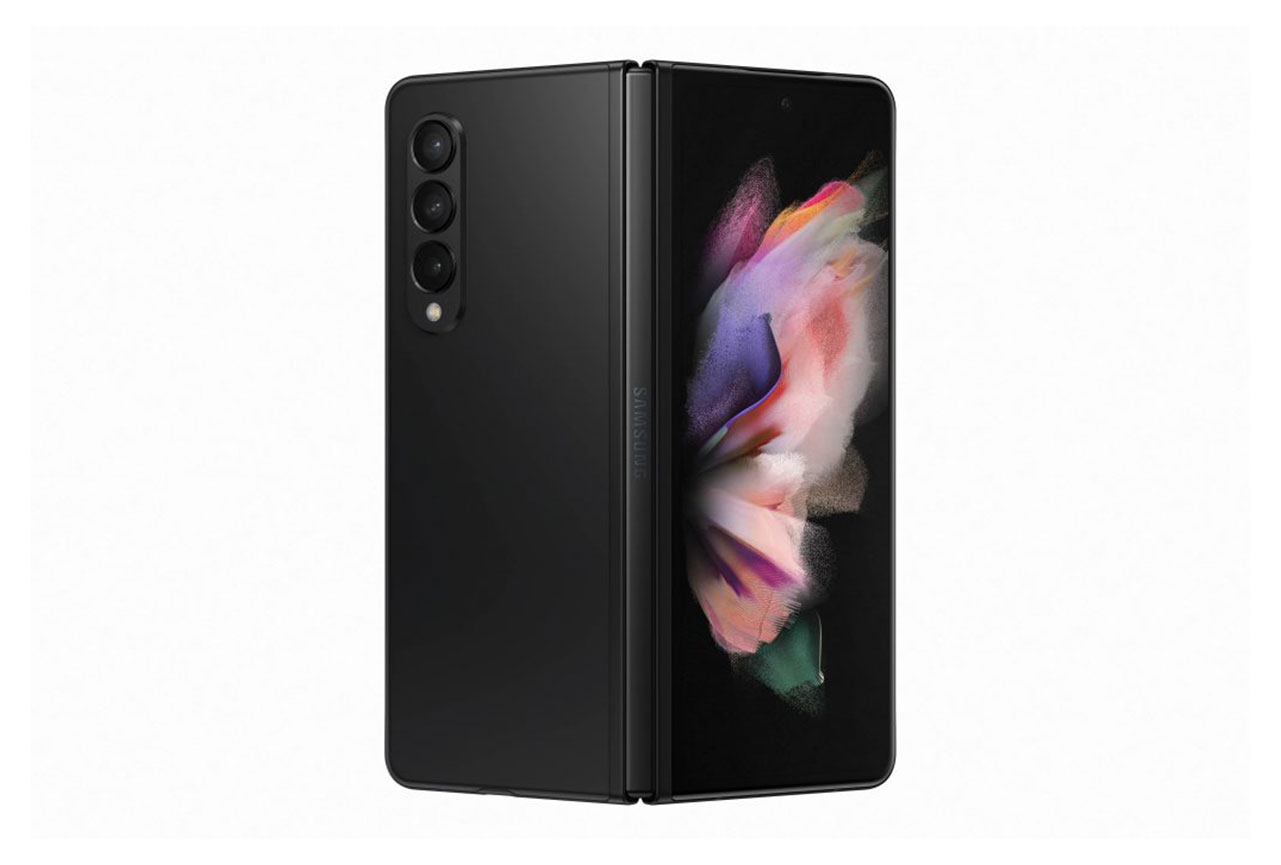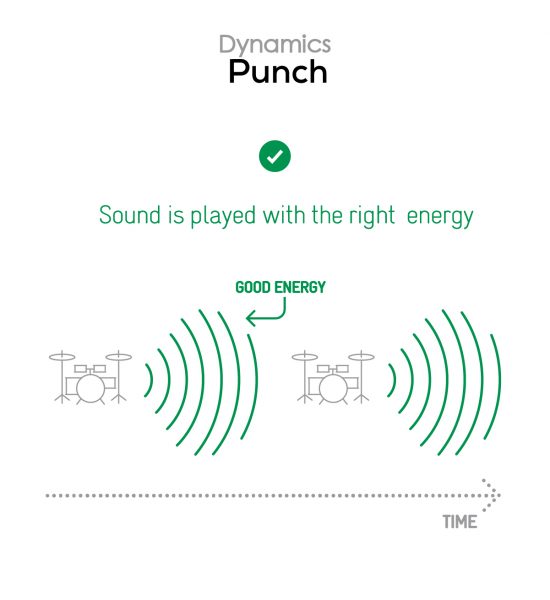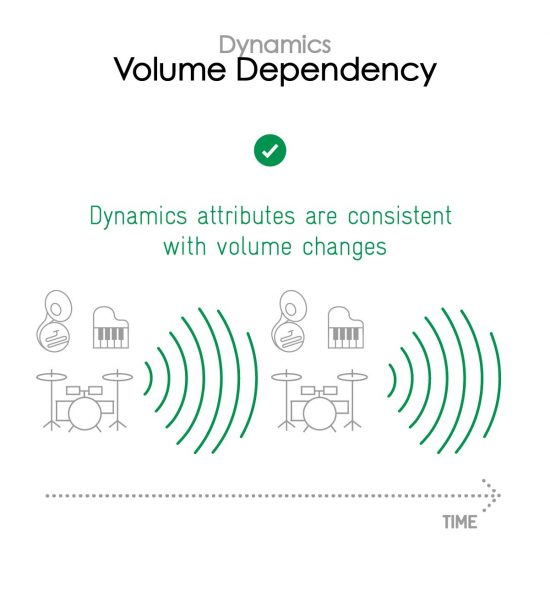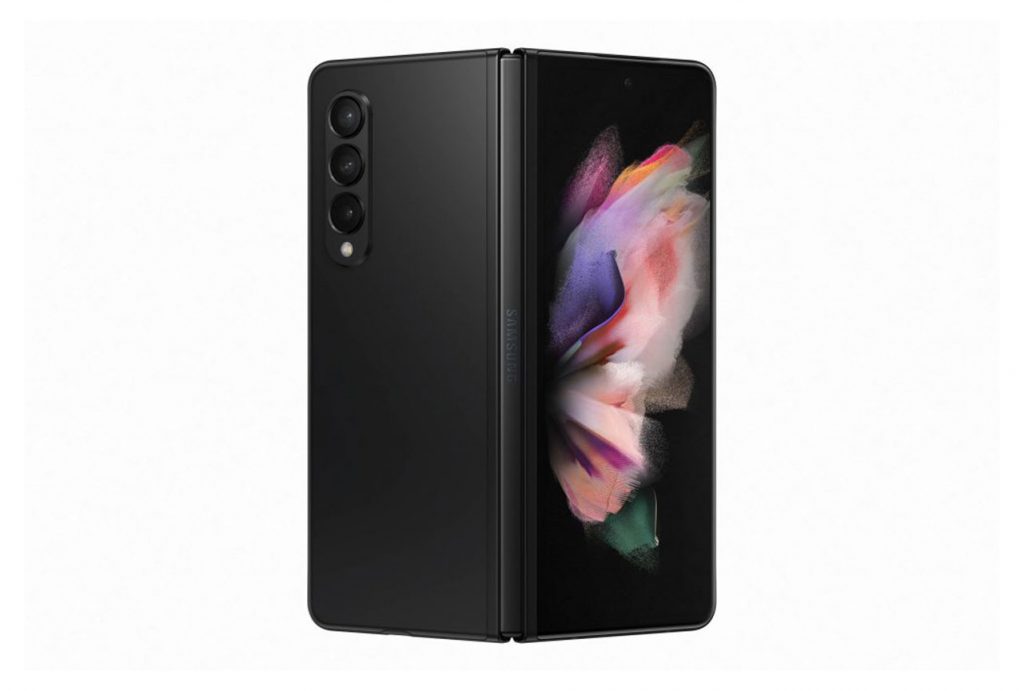The Galaxy Z Fold3 5G is the third generation in Samsung’s Z Fold line, with a 6.2-inch HD+ Dynamic AMOLED cover display, in addition to its main, 7.6-inch QXGA+ AMOLED display. Equipped with Qualcomm’s top-of-the-line Snapdragon 888 chipset, the Z Fold3 is also IPX8-certified (water-resistant), and boasts a price tag as enormous as its unfolded screen. In the audio department, Samsung’s latest foldable iteration and its two speakers promise immersive stereo sound thanks, among others, to the embedded Dolby Atmos technology.
We put the Samsung Galaxy Z Fold3 5G through our rigorous DXOMARK Audio test suite to measure its performance both at playing audio back through its built-in speakers and at recording sound using its built-in microphones. In this review, we’ll break down how it fared in a variety of tests and in several common use cases.
Key audio specifications include:
-
Two speakers (middle-top and middle-bottom)
- No 3.5mm headphone jack
- Dolby Atmos
About DXOMARK Audio tests: For scoring and analysis in our smartphone audio reviews, DXOMARK engineers perform a variety of objective tests and undertake more than 20 hours of perceptual evaluation under controlled lab conditions. This article highlights the most important results of our testing. Note that we evaluate both Playback and Recording using only the device’s built-in hardware and default apps.
(For more details about our Playback protocol, click here; for more details about our Recording protocol, click here.)
Test summary
Scoring
Sub-scores and attributes included in the calculations of the global score.

Samsung Galaxy Z Fold3 5G


 109th
109th 63rd
63rdPlayback
Pros
- Very good tonal balance, substantially better than that of its predecessor.
- Good dynamics, with sharp attack, good bass precision and impactful punch
Cons
- Wideness does not live up to expectations considering the device’s size and architecture, especially in portrait mode (unfolded).
- Minimum volume isn’t properly tuned.
- Very aggressive tonal balance at maximum volume
Recording
Cons
- Insufficient brightness and inconsistent lower midrange
- Recordings made in the Memo app are monophonic.
- Disappointing loudness in selfie videos & memos
The Samsung Galaxy Z Fold3 5G achieved an overall Audio score of 72, which puts it in very good company within the DXOMARK ranking scale, right between the Xiaomi Mi 11 Ultra and the Apple iPhone 12, but still nine points down from our top-scoring phone, the Black Shark 4 Pro.
In playback, it is a reliable companion for playing games or listening to music, but movie playback is less advisable. As a recording device, while the Galaxy Z Fold3 5G isn’t particularly skilled for recording meetings, it is simply the highest-scoring device we’ve measured to date when it comes to handling high-SPL scenarios. Concert aficionados, here is the best of the best!
In playback tests, the Samsung Galaxy Z Fold3 5G outperforms its predecessor in every category, with a much more harmonious tonal balance, impactful dynamics, above-average spatial attributes, and satisfying maximum volume, which make it a decent playback device for gaming, or listening to musing. That said, the sound field isn’t as wide as we’d hoped, the minimum volume step doesn’t allow highly dynamic contents to remain fully intelligible, and the tonal balance becomes quite aggressive at maximum volume: in terms of audio purely, and despite its extraordinary screen size, the Z Fold3 isn’t the best-suited smartphone for watching movies.
As a recording device, the Samsung Galaxy Z Fold3 5G delivers a contrasted performance. Memos and meeting recordings are the least well endowed, with a monophonic rendering, below-target loudness, and deeply inconsistent lower midrange. On the other hand, recordings made in loud environments, such as concerts, exhibit such excellent timbre, dynamics, volume and artifacts behavior, that they simply earned the Samsung Galaxy Z Fold3 5G the best sub-score we’ve measured to date for this use case.
Sub-scores explained
The DXOMARK Audio overall score of 72 for the Samsung Galaxy Z Fold3 5G is derived from its Playback and Recording scores and their respective sub-scores. In this section, we’ll take a closer look at these audio quality sub-scores and explain what they mean for the user.
Playback

Timbre
Samsung Galaxy Z Fold3 5G
68
89
Timbre tests measure how well a phone reproduces sound across the audible tonal range and takes into account bass, midrange, treble, tonal balance, and volume dependency.
The Galaxy Z Fold3 5G presents an above-average timbre performance, with good treble, natural midrange, and a correct amount of bass. This adds up to a harmonious tonal balance — largely better than that of the Fold2.
At soft volumes, the overall balance remains pleasingly clear. However, at maximum volume, aggressive high-mids lead to pervasive distortions, and across all listening levels, our engineers noted a slight lack of both high and low-end extension, and of low-mids warmth.

Dynamics
Samsung Galaxy Z Fold3 5G
68
81
DXOMARK’s dynamics tests measure how well a device reproduces the energy level of a sound source, and how precisely it reproduces bass frequencies.
Thanks to the good presence of bass, bass precision is substantially better than the Fold 2. Attack at nominal volume is correct, and so is punch, which ensures good energy to kick drums in particular. Additionally, volume variations do not impact the phone’s dynamic results, which remain consistent from softest to loudest volumes.



Spatial
Samsung Galaxy Z Fold3 5G
68
88
The sub-attributes for perceptual spatial tests include localizability, balance, distance, and wideness.
While not exceptional, all spatial attributes are on target. Wideness in landscape mode of the sound field is good, but could have been even better considering the device’s size. Further, the phone does not ensure stereo reproduction in portrait mode, which means that the audio scene doesn’t spread out wider when the phone is unfolded.
Balance between the left and right channels is well centered, except, here too, in portrait mode, centered sources are perceived a bit too high. Distance rendering is realistic thanks to the natural midrange, and sources are rather precisely localizable within the sound field.

Volume
Samsung Galaxy Z Fold3 5G
68
91
Volume tests measure both the overall loudness a device is able to reproduce and how smoothly volume increases and decreases based on user input.
The phone’s speakers provide a satisfying maximum volume. Here are a few sound pressure levels (SPL) measured when playing our sample recordings of hip-hop and classical music at maximum volume:
| Hip-Hop | Classical | |
| Samsung Galaxy Z Fold3 5G | 72.6 dBA | 69.7 dBA |
| Apple iPhone 13 Pro Max | 72.5 dBA | 69.5 dBA |
| Asus Smartphone for Snapdragon Insiders | 72 dBA | 68.2 dBA |
While decent, minimum volume tuning could be better: dynamic contents, such as classical music or movies, can be difficult to fully understand.

Artifacts
Samsung Galaxy Z Fold3 5G
90
113
Artifacts tests measure how much source audio is distorted when played back through a device’s speakers. Distortion can occur both because of sound processing in the device and because of the quality of the speakers.
At maximum volume, unwanted resonances, distortion, and slight compression can occur. That said, at nominal volume, no artifacts — whether spectral, temporal or noise-related — are perceivable. All in all, the phone reaches an excellent score in this category, well above the average, and only six points away from its sibling and title-holder in this category, the Galaxy A52 5G.
Recording

Timbre
Samsung Galaxy Z Fold3 5G
81
91
Videos made with the rear cameras (life videos) exhibit a slightly resonant and nasal tonal balance, as well as a lack of low-midrange body. High midrange to lower treble (around 2 to 8 kHz) is present but lacks clarity: both brightness and high-end extension are insufficient.
Selfie videos, memos, and meeting recordings are impaired by a resonant lower midrange, which despite being recessed, is still muddy and blurry. Further, upper midrange to lower treble sounds metallic, while treble is fairly dark.
It is in the electronic concert use case that the Z Fold3 wins its spurs: when recording in loud environments, it provides an excellent timbre, even surpassing previous top scorers with its richness, neutrality, transparency, and natural capture. The low-end is clean, powerful, and deep, without stepping over the other frequency ranges. Midrange is full, rich, and very natural. Treble on its part is bright, but never too harsh, with a very satisfying high-end extension.

Dynamics
Samsung Galaxy Z Fold3 5G
66
81
Here too, the phone excels at recording in loud environments. Compression is well-tuned, never turning into pumping, and leaving the envelope very accurate. Envelope, for that matter, is fairly precise across all use cases, except when using the memo app. Plosives, however, could be sharper, especially in selfie videos, memos and meeting recordings. Finally, the signal-to-noise ratio is correct, although voices could stand out a little more, particularly in memos.

Spatial
Samsung Galaxy Z Fold3 5G
55
78
Wideness capture in life videos is on par with our top-scoring devices — which doesn’t come as a surprise, considering the size of the device. Wideness in selfie videos is less impressive, however, know that the test was performed with the device folded so as to keep the comparison relevant with other foldable devices. Against all expectations for a modern — let alone premium — smartphone, recordings made in the Memo app are monophonic, which considerably lowers the phone’s wideness sub-score.
Distance capture is fairly correct in videos and meeting recordings, but slightly less so in selfie videos, with voices sounding farther than they should. As for localizability, it is slightly better in indoors than outdoor scenarios.

Volume
Samsung Galaxy Z Fold3 5G
69
99
As you can guess it from previous observations, the maximum level reachable without perceivable artifacts is very high, thus earning the Fold3 an excellent sub-score in this attribute. As for nominal loudness, it is good in life videos, but a bit below target in selfie videos or memos. Here are our test results, measured in LUFS (Loudness Unit Full Scale); as a reference, we expect loudness levels to be above -24 LUFS for recorded content:
| Meeting | Life Video | Selfie Video | Memo | |
| Samsung Galaxy Z Fold3 5G | -26.6 LUFS | -20.3 LUFS | -23.3 LUFS | -21.6 LUFS |
| Apple iPhone 13 Pro Max | -25.5 LUFS | -22.7 LUFS | -20.2 LUFS | -18.2 LUFS |
| Asus Smartphone for Snapdragon Insiders | -23.8 LUFS | -19 LUFS | -18 LUFS | -17.7 LUFS |

Artifacts
Samsung Galaxy Z Fold3 5G
73
97
Recordings made with the Z Fold3 may exhibit slightly compressed dynamics, and tests show occasional hissing on sibilants in both our indoor and outdoor real-life use cases. That doesn’t apply to recordings made in loud environments, which earned the very coveted sub-score of 100 (i.e. no artifacts observed). You can check for artifacts yourself in this sample domestic recording:
When unfolded, the device isn’t prone to occlusions or finger noises, but is pretty sensitive to wind. Symmetrically, when folded, it is more resilient to wind, but more subject to total hand/finger occlusion.
Despite occasional low-end resonances in urban scenarios and a rather dark-sounding tonal balance, background recordings sound quite natural, and are generally artifacts-free.
Conclusion
Samsung’s latest foldable premium smartphone shows many improvements in the audio area over its predecessor, consistently surpassing it in almost every category. In playback, it is a reliable companion for playing games or listening to music, but movie playback is less advisable. As a recording device, while the Galaxy Z Fold3 5G isn’t particularly adept at recording meetings, it is simply the highest-scoring device so far when it comes to handling high-SPL environments. Concert aficionados, here is the best of the best!




DXOMARK encourages its readers to share comments on the articles. To read or post comments, Disqus cookies are required. Change your Cookies Preferences and read more about our Comment Policy.